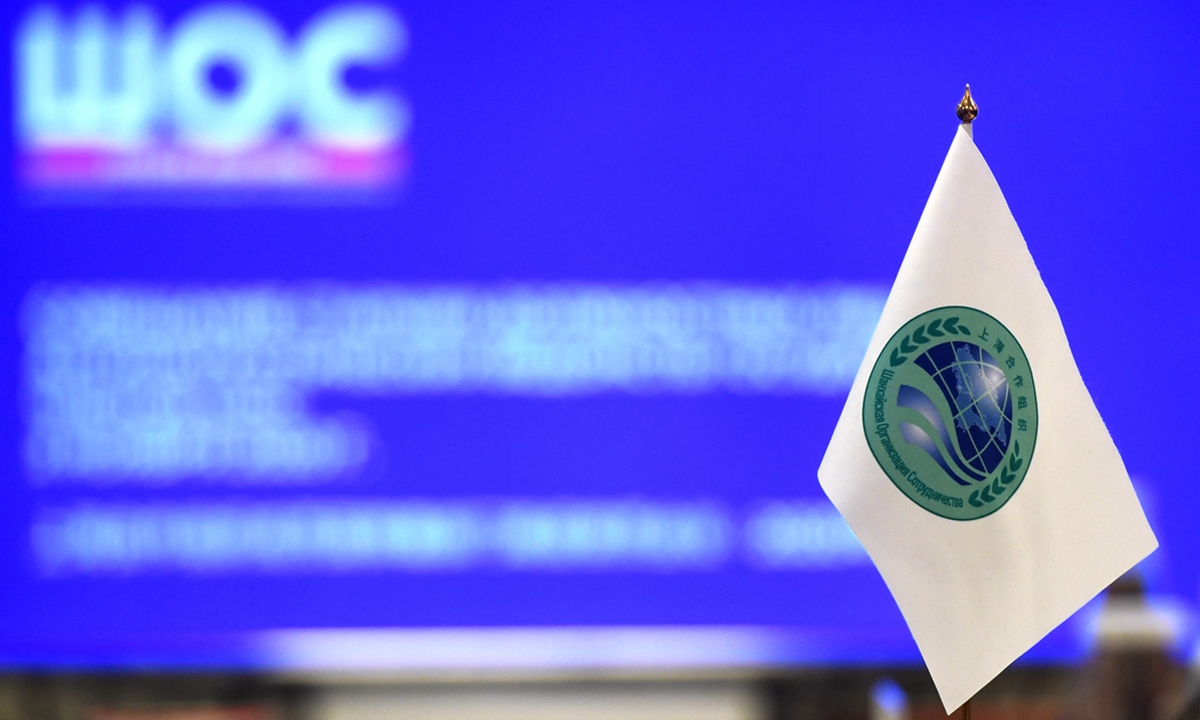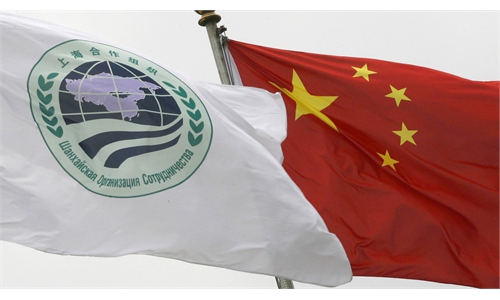
A flag with the Shanghai Cooperation Organisation's logo. Photo: AFP
The 23rd meeting of the Council of Heads of State of the Shanghai Cooperation Organisation (SCO) is scheduled to be held in a virtual format on Tuesday. Be the event an in-person meeting or virtual summit, SCO's potential to continue enhancing its global influence remains intact, and it will not lose its dynamic for sustained development.
The primary driving force behind the increasing importance of the SCO in the Eurasian continent is its continuous enlargement. After India and Pakistan became full members of the SCO in 2017, Iran will become the ninth member, officially expanding the SCO's scope to the West Asian region. Belarus is also on the way to join the group. Furthermore, countries such as Saudi Arabia, Qatar, and Egypt have expressed their readiness to join the organization. Although they are not currently the focus of SCO enlargement, it can be foreseen that one day the SCO will develop into a regional international organization covering three continents of Asia, Africa, and Europe, with the largest territory and population, among regional organizations.
The SCO is attracting more and more countries to join, which demonstrates a series of its advantages during the uncertain period in the time.
Firstly, in the context of current decline of global governance, regional governance mechanisms represented by the SCO are receiving increasing attention. The Russia-Ukraine conflict sounded the death knell for US-dominated global governance in the 21st century, highlighting the dilemma of global governance - developed countries in Europe and America are unable to bear the responsibility of global governance. With narrow-minded nationalism, protectionism, and populism on the rise, those countries are pursuing their own maximized interests in the process of globalization. Therefore, global attention on the long-term development of regional governance is growing. Regional multilateral cooperation mechanisms such as the SCO naturally become the hope for collectively addressing global challenges for underdeveloped countries in the Eurasian continent.
Secondly, in the current global political ecology filled with ideological exclusivism, the Shanghai Spirit demonstrates its attractiveness. For over two decades, the SCO has consistently upheld the Shanghai Spirit, which features mutual trust, mutual benefit, equality, consultation, respect for diverse civilizations and pursuit of common development, has been instrumental in ensuring the security of member states, promoting practical cooperation, and enhancing exchanges and mutual learning among different civilizations.
For a region like the Eurasian continent, which is filled with diverse religions, cultures, and ethnicities, inclusivity rather than exclusivity is the key condition for the success of multilateral cooperation mechanisms. It is also because an increasing number of countries have realized the value of the Shanghai Spirit, it has become a natural choice for the Arab world to embrace the SCO after enduring enough ideological preaching from Western countries.
As the leader of the SCO, China has promoted the organization's influence on the Eurasian continent. Compared to the time when the SCO was founded in 2001, China's comprehensive strength and political influence have undergone a tremendous transformation. At that time, China had just started a period of rapid development. Today, China's comprehensive national strength is second only to the US, and its voice in international politics has greatly increased. China has actively promoted peace talks and mediation in the Russia-Ukraine conflict. It is worth noting that there has been no precedent in modern history for an Asian country to mediate in European conflicts. As China develops, the SCO's prominence has risen, and international attention toward the organization has significantly increased. Consequently, the notion of calling the SCO a "sleeping beauty" has gradually disappeared.
With the increasing influence of the SCO, the organization needs to shoulder greater responsibilities. The Russia-Ukraine conflict has reshaped the geopolitical landscape of the Eurasian continent and profoundly affected regional security. Traditional security risks resulting from great power competition, combined with non-traditional security risks brought about by international terrorism and drug trafficking, have led to a sharp deterioration in the security situation on the Eurasian continent. On the other hand, the Russia-led Collective Security Treaty Organization (CSTO) has been stagnant due to internal conflicts, while the West is unable to construct a new security architecture in the region. This makes the SCO the a hope to fill the "security deficit" on the Eurasian continent.
As an old Chinese saying goes, nothing is more beneficial than stability, and nothing is more detrimental than chaos. For countries on the Eurasian continent, a stable and secure external environment is crucial for them to overcome poverty and achieve prosperity. Over the past 20 years, the SCO has been at the forefront of combating the "three evil forces," namely terrorism, extremism, and separatism, and has signed the world's first intergovernmental convention on countering extremism. It has organized more than 10 "Peace Mission" joint counter-terrorism exercises, becoming a stabilizing force for security in the Eurasian region.
As an important founding member of the SCO, China has always attached great importance to, supported, and promoted the development of the SCO. It can be foreseen that in the future, China will continue to deepen cooperation in the field of security with other SCO member states, striving to create a jointly built and shared security framework and contributing to the construction of a closer SCO community with a shared future.
The author is a lecturer at the China National Institute for SCO International Exchange and Judicial Cooperation of Shanghai University of Political Science and Law. opinion@globaltimes.com.cn

